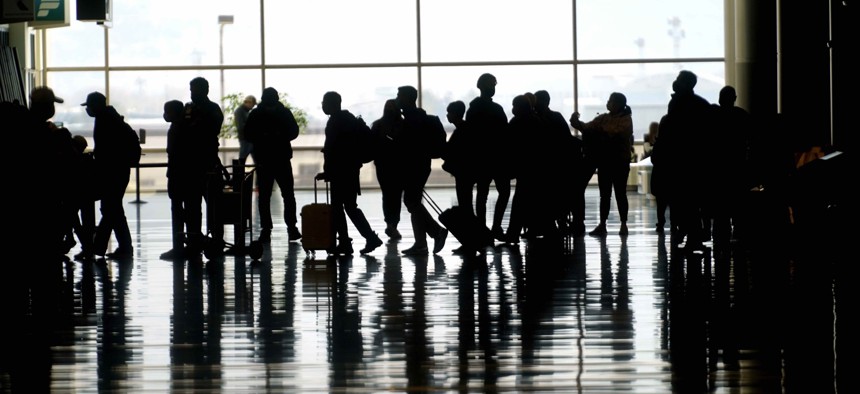GOP Governors Take Action to Block Covid ‘Vaccine Passports’

Travelers walk through the Salt Lake City International Airport Wednesday, March 17, 2021, in Salt Lake City. AP Photo/Rick Bowmer
The Biden administration is making clear it is not planning to pursue a federal proof-of-vaccination program.
Multiple Republican governors are rejecting the concept of Covid-19 “vaccine passports,” which would require people to show proof that they’re vaccinated before entering spaces, or taking part in activities, where there could be a risk of the coronavirus spreading.
The notion of paper or digital vaccine certifications for individuals has become politically charged, as critics raise concerns about privacy, equity and government overreach. The Biden administration is indicating it has no plans to impose such a requirement. Even so, GOP state leaders are staking out opposition to local governments and businesses doing so.
Texas Gov. Greg Abbott on Tuesday announced an executive order barring agencies and local governments in the state from creating vaccine passport requirements, or making services contingent on a person’s Covid-19 vaccination status. The order also applies to public and private entities that receive state funds, including grants, loans and contracts.
“Texans are returning to normal life as more people get the safe and effective Covid-19 vaccine. But, as I've said all along, these vaccines are always voluntary and never forced," Abbott said in a statement. “Government should not require any Texan to show proof of vaccination and reveal private health information just to go about their daily lives.”
Florida Gov. Ron DeSantis last week signed an order similar to Abbott’s. DeSantis’ directive also prohibits businesses from requiring proof of vaccination from customers or patrons.
In Georgia, Gov. Brian Kemp tweeted on Tuesday that he does not and will not support any kind of state-mandated vaccine passport. “While the development of multiple safe, highly effective Covid-19 vaccines has been a scientific miracle,” Kemp added, “the decision to receive the vaccine should be left up to each individual.”
White House Press Secretary Jen Psaki on Tuesday emphasized that the Biden administration is not seeking to implement a vaccine passport-style system.
"The government is not now, nor will we be supporting a system that requires Americans to carry a credential,” she said. “There’ll be no federal vaccinations database and no federal mandate requiring everyone to obtain a single vaccination credential."
“As these tools are being considered by the private and non-profit sectors, our interest is very simple from the federal government, which is Americans’ privacy and rights should be protected, and so that these systems are not used against people unfairly,” Psaki added.
As of Tuesday, about 108 million people nationwide had received at least one dose of the vaccine, according to the U.S. Centers for Disease Control and Prevention. That figure is roughly one-third of the nation’s total population.
New York last month launched a voluntary app-based platform people can download on their smartphones to provide a “pass” showing whether they’ve received the vaccine, or had a recent negative Covid-19 test result. Developed with IBM, the pass platform uses secure QR codes that participating businesses can scan with a companion app to verify a person’s status.
Gov. Andrew Cuomo’s office framed the passes as a tool that could help to reopen businesses that have been shuttered or running with curtailed capacity due to the pandemic. New York City’s Madison Square Garden was one of the early venues to opt in for the pass program.
The New York State Restaurant Association was among the groups that applauded the initiative. “Our members support any effort like this to ensure a safe and robust reopening,” Melissa Fleischut, the group’s CEO, said at the time the platform was released.
IBM and state officials stressed that the technology has strong privacy protections and that no private health data is stored or tracked within the apps.
“The state is modeling for the rest of the country how new, technology-enabled approaches can help safely reinvigorate economies while also striving to protect public health,” said Steve LaFleche, general manager for IBM public and federal markets.
In addition to privacy concerns, some experts worry about the equity implications of giving people who are able to get the vaccine earlier a credential to resume normal activities, while leaving covid-era restrictions in place for those who have to wait longer to get a shot. This is especially problematic given the limited supply of the vaccine available so far.
In a recent New England Journal of Medicine article, David Studdert, a law professor at Stanford University, and Mark Hall, a health care law scholar at Wake Forest University, noted this and other equity issues. “Even after supply constraints ease, rates of vaccination among racial minorities and low-income populations seem likely to remain disproportionately low,” they wrote.
“If history is a guide,” they added, “programs that confer social privilege on the basis of ‘fitness’ can lead to invidious discrimination.”
They also point out that granting privileges to people who have received the vaccine would penalize those with religious or philosophical objections to vaccinations, and that there’s a lack of consensus on the best approach to accurately certify vaccinations.
But Studdert and Hall also write that they “believe the objections raised fall short of justifying a ban on any and all uses of vaccine certification” and suggest that there’s a role for governments to play in setting guidelines and standards as the private sector adopts these types of programs.
Bill Lucia is a senior reporter for Route Fifty and is based in Olympia, Washington.
NEXT STORY: How to Assemble a Successful Grant Proposal






